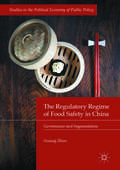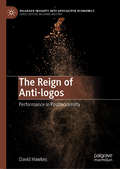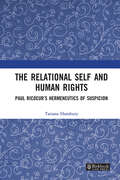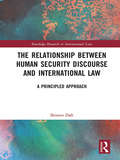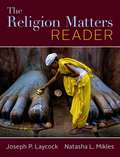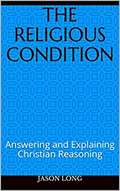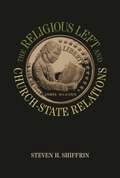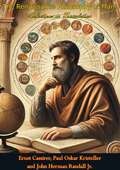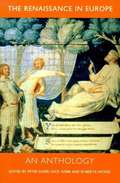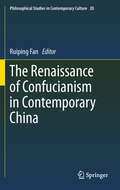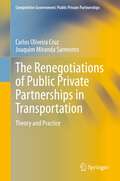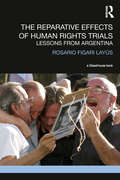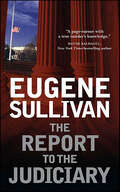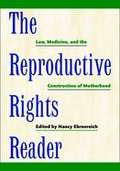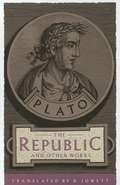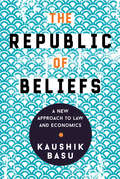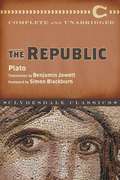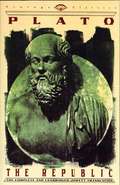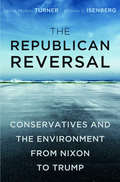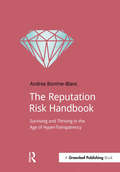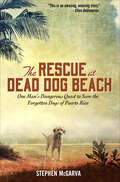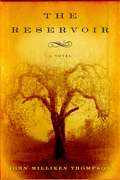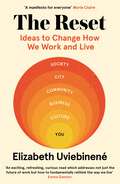- Table View
- List View
The Regulatory Landscape in the EU for Dairy Products Derived from Precision Fermentation: An Analysis on the Example of Cheese (SpringerBriefs in Law)
by Kai P. Purnhagen Federica Ronchetti Laura SpringerThis book assesses the EU legal framework applicable to dairy products obtained through precision fermentation. It maps the authorisation and labelling requirements for these products to be placed on the EU market. It compares these provisions to those governing the food markets in the USA and Singapore, which are considered to be more innovation-friendly. At the time of writing, the precision-fermented dairy sector is still in the developmental phase, with only a few precision-fermented dairy alternatives available on the market, none of which are present in the EU. Regulatory uncertainty has been cited as significant obstacle for food business operators seeking to introduce alternative protein products in the EU. The book confirms these reports, as the current EU regulatory framework presents several legal uncertainties that are challenging for food business operators to overcome. Broadly speaking, there are two authorisation frameworks applicable to dairy products obtained through precision fermentation in the EU. The choice between these frameworks depends on the presence of genetically modified organisms (GMOs) or residues thereof in the final product. If such GMOs or residues are present, the pre-market authorisation procedure is governed by the Genetically Modified Food and Feed Regulation (GMFR). If the final product does not contain any GMOs or residues, it falls under the scope of the Novel Food Regulation (NFR), and the pre-market authorisation procedure is governed accordingly. Both of these authorisation pathways entail high regulatory requirements, which can pose challenges for the development of the precision fermentation sector. Despite the difficulty in accurately classifying products, it is crucial for food business operators to comprehend the applicable legal framework early in the product development process, given that the authorisation paths differ in their standards. In addition to pre-market authorisation requirements, companies must address labelling issues. Food labelling shall provide a basis for consumers to make informed choices in relation to the foods they consume. The primary objective of EU food labelling law is to prevent consumer deception , making it crucial for dairy products and their animal-free alternatives, to adhere to a stringent naming law as stipulated in the Common Market Organisation and specific accompanying legislation. Moreover, it is imperative to consider regulations regarding the use of health and nutrition claims, as well as labels such as “vegan” or “organic”, etc. Furthermore, the labelling of novel foods and genetically modified foods may necessitate mandatory information specified in the authorisation process. The book serves as a comprehensive guideline for food business operators involved in the production of precision-fermented dairy alternatives, aiding them in navigating the intricate European regulatory landscape.
The Regulatory Regime of Food Safety in China
by Guanqi ZhouThis book examines the decade from 2004 to 2013 during which people in China witnessed both a skyrocketing number of food safety crises, and aggregating regulatory initiatives attempting to control these crises. Multiple cycles of "crisis - regulatory efforts" indicated the systemic failure of this food safety regime. The book explains this failure in the "social foundations" for the regulatory governance of food safety. It locates the proximate causes in the regulatory segmentation, which is supported by the differential impacts of the food regulatory regime on various consumer groups. The approach of regulatory segmentation does not only explain the failure of the food safety regime by digging out its social foundation, but is also crucial to the understanding of the regulatory state in China.
The Reign of Anti-logos: Performance in Postmodernity (Palgrave Insights into Apocalypse Economics)
by David HawkesThe concept of ‘performativity’ has risen to prominence throughout the humanities. The rise of financial derivatives reflects the power of the performative sign in the economic sphere. As recent debates about gender identity show, the concept of performativity is also profoundly influential on people’s personal lives. Although the autonomous power of representation has been studied in disciplines ranging from economics to poetics, however, it has not yet been evaluated in ethical terms. This book supplies that deficiency, providing an ethical critique of performative representation as it is manifested in semiotics, linguistics, philosophy, poetics, theology and economics. It constructs a moral criticism of the performative sign in two ways: first, by identifying its rise to power as a single phenomenon manifested in various different areas; and second, by locating efficacious representation in its historical context, thus connecting it to idolatry, magic, usury and similar performative signs. The book concludes by suggesting that earlier ethical critiques of efficacious representation might be revived in our own postmodern era.
The Relational Self and Human Rights: Paul Ricoeur’s Hermeneutics of Suspicion
by Tatiana HansburyThis book takes up Paul Ricoeur’s relational idea of the self in order to rethink the basis of human rights. Many schools of critical theory argue that the idea of human rights is based on a problematic conception of the human subject and the legal person. For liberals, the human is a possessive and self-interested individual, such that others are either tools or hurdles in their projects. This book offers a novel reading of subjectivity and rights based on Paul Ricœur’s re-interpretation of human subjectivity as a relational concept. Taking up Ricoeur’s idea of recognition as a ‘reciprocal gift’, it argues that gift exchange is the relation upon which authentic, non-abstract, human subjectivity is based. Seen in this context, human rights can be understood as tokens of mutual recognition, securing a genuinely human life for all. The conception of human rights as gift effectively counters their moral individualism and possessiveness, as the philosophical anthropology of an isolated ego is replaced by that of a related, dependent and embedded self. This original reinterpretation of human rights will appeal to scholars of legal theory, jurisprudence, politics and philosophy.
The Relationship between Human Security Discourse and International Law: A Principled Approach (Routledge Research in International Law)
by Shireen DaftThe concept of human security has emerged in international relations and policy as an idea which not only seeks to relocate the focus of international society on the individual, but also challenges the current priorities of the international community. In particular it places emphasis on promoting and facilitating a nexus between security, development and human rights. It is potentially a paradigm in the making, gaining considerable momentum within the UN, international relations scholarship and regional bodies. And yet by-and-large it continues to be unexplored by the international legal community, despite the success of a number of international treaties being attributed to the discourse. This book seeks to address this gap, and establish the nature of the relationship between human security discourse and international law, determining whether human security can meaningfully contribute to the international legal framework. To determine this, the book analyses the core principles of human security discourse and examines the degree to which they find parallels in the existing normative structure of international law. The book examines the how the broad-narrow debate that dominates human security discourse has played out in international law-making. It goes on to consider the processes for the creation of so called ‘human security’ treaties in order to determine a blueprint for future development of international human security treaty law. In concluding Shireen Daft sets out a structured principled approach through which international legal scholarship can engage with human security, highlighting the ways in which engagement between the two fields can be sustained.
The Relevant Market in International Economic Law
by Christian A. MelischekThis book provides what international trade law has hitherto lacked: a coherent analysis of 'product likeness' under Article III of the GATT. Christian A. Melischek develops an economic approach to the interpretation of 'like' products on the basis of a comparative analysis with antitrust theories on market definition. Not only does he propose a specific substantive economic test to render the notion of product likeness operational, but he also examines the institutional and procedural frameworks for expert economic evidence necessary to implement an economic approach to the interpretation of product likeness. On a methodological level, the book adds a new interdisciplinary dimension to the legal debate by exploring the use of quantitative and econometric methods for the implementation of the proposed economic test.
The Religion Matters Reader
by Joseph Laycock Natasha MiklesThe Religion Matters Reader is an innovative (and inexpensive) complement to Stephen Prothero’s pathbreaking and enormously teachable introductory text. The readings are accessible, diverse, and tied to the organizing principles of RELIGION MATTERS. Each chapter includes five readings—problem/solution, technique, two exemplar profiles, and a controversy. A rich teaching tool created by the same authors who created the text’s supporting media resources.
The Religious Condition: Answering And Explaining Christian Reasoning
by Jason LongThe Bible is not the word of God. The Religious Condition is a broad look at the factors that drive Christians to believe otherwise. This part-philosophical, part-scientific overview explores the psychological and sociocultural influences that subtly provoke Christians to maintain their antiquated views of the universe. While billions of people around the world have merely assumed the solid validity of the Bible, The Religious Condition presents a series of profound questions regarding the implications of such premature assuredness. In addition to the conclusions from actual psychological studies that support these viewpoints, covered topics include the various ways that Christians approach scientific conflicts, the defense of a perfectly moral god who commits immoral acts, the illogical methods of argumentation that Christians invoke in the maintenance and defense of their beliefs, and disingenuous methods utilized by those who wish to defend the idea that religious beliefs are based on reason instead of faith. The Religious Condition answers actual reader responses to the previous works of Jason Long, a former Christian. His fresh experiences in the church and advanced levels of educational enlightenment make him the perfect individual to present this vehemently unpopular, yet undeniably appealing topic.
The Religious Left and Church-State Relations
by Steven H. ShiffrinIn The Religious Left and Church-State Relations, noted constitutional law scholar Steven Shiffrin argues that the religious left, not the secular left, is best equipped to lead the battle against the religious right on questions of church and state in America today. Explaining that the chosen rhetoric of secular liberals is poorly equipped to argue against religious conservatives, Shiffrin shows that all progressives, religious and secular, must appeal to broader values promoting religious liberty. He demonstrates that the separation of church and state serves to protect religions from political manipulation while tight connections between church and state compromise the integrity of religious institutions. Shiffrin discusses the pluralistic foundations of the religion clauses in the First Amendment and asserts that the clauses cannot be confined to the protection of liberty, equality, or equal liberty. He explores the constitutional framework of religious liberalism, applying it to controversial examples, including the Pledge of Allegiance, the government's use of religious symbols, the teaching of evolution in public schools, and school vouchers. Shiffrin examines how the approaches of secular liberalism toward church-state relations have been misguided philosophically and politically, and he illustrates why theological arguments hold an important democratic position--not in courtrooms or halls of government, but in the public dialogue. The book contends that the great issue of American religious politics is not whether religions should be supported at all, but how religions can best be strengthened and preserved.
The Renaissance Philosophy of Man: Selections in Translation
by Ernst CassirerExplore the profound and transformative ideas of the Renaissance with The Renaissance Philosophy of Man: Selections in Translation. This essential anthology brings together pivotal texts from some of the most influential thinkers of the Renaissance, offering readers a comprehensive insight into the philosophical currents that shaped this remarkable period in history.Edited by renowned scholars Ernst Cassirer, Paul Oskar Kristeller, and John Herman Randall Jr., this collection presents carefully selected translations of key philosophical works that highlight the diverse and dynamic nature of Renaissance thought. The book covers a wide array of topics, from humanism and individualism to the relationship between humanity and the divine.The Renaissance Philosophy of Man features writings from seminal figures such as Petrarch, Pico della Mirandola, Marsilio Ficino, and Giovanni Pontano. Each selection is accompanied by insightful introductions and annotations that provide historical context and clarify the significance of the ideas presented. The editors' scholarly expertise ensures that readers gain a deep and nuanced understanding of the philosophical developments of the time.The anthology delves into the central themes of Renaissance philosophy, including the dignity of man, the potential for human achievement, and the revival of classical learning. These texts reflect the era's optimism and its belief in the power of human reason and creativity. The Renaissance thinkers' quest for knowledge and their engagement with ancient sources laid the groundwork for modern philosophy and science.Join Ernst Cassirer, Paul Oskar Kristeller, and John Herman Randall Jr. in exploring the rich philosophical landscape of the Renaissance. The Renaissance Philosophy of Man offers readers a window into a pivotal era that continues to influence contemporary thought and culture.
The Renaissance in Europe: An Anthology
by Nick Webb Peter Elmer Roberta WoodCurrent research on the Renaissance has emphasized the need to look again at the original texts, documents and artefacts which, taken together, constitute the primary source of evidence for the re-evaluation of its historical significance. This volume represents one attempt to reflect this renewal of interest in returning to first principles. The Anthology presents a series of carefully selected primary sources across a wide range of disciplines, ordered thematically and reflecting the interests of scholars in a variety of fields of Renaissance studies. There are sections on humanism and its impact on philosophy and politics; Renaissance court culture, with particular emphasis on the courts of northern Italy and the Kingdom of Hungary; poetry and drama in Renaissance Britain; the Reformation; and science, magic and witchcraft. While some of the extracts are short and familiar, others appear here, in translation, for the first time, including, for example, an early sixteenth-century demonology by the Italian humanist Gianfrancesco Pico della Mirandola. The volume is illustrated throughout and each extract is introduced by a brief headnote describing the author and the source.
The Renaissance of Confucianism in Contemporary China
by Ruiping FanA new generation of Confucian scholars is coming of age. China is reawakening to the power and importance of its own culture. This volume provides a unique view of the emerging Confucian vision for China and the world in the 21st century. Unlike the Neo-Confucians sojourning in North America who recast Confucianism in terms of modern Western values, this new generation of Chinese scholars takes the authentic roots of Confucian thought seriously. This collection of essays offers the first critical exploration in English of the emerging Confucian, non-liberal, non-social-democratic, moral and political vision for China's future. Inspired by the life and scholarship of Jiang Qing who has emerged as China's exemplar contemporary Confucian, this volume allows the English reader access to a moral and cultural vision that seeks to direct China's political power, social governance, and moral life. For those working in Chinese studies, this collection provides the first access in English to major debates in China concerning a Confucian reconceptualization of governance, a critical Confucian assessment of feminism, Confucianism functioning again as a religion, and the possibility of a moral vision that can fill the cultural vacuum created by the collapse of Marxism.
The Renegotiations of Public Private Partnerships in Transportation: Theory and Practice (Competitive Government: Public Private Partnerships)
by Carlos Oliveira Cruz Joaquim Miranda SarmentoThis book provides a theoretical basis for understanding the phenomenon of renegotiations in Public Private Partnerships (PPPs). It analyzes the case of transport projects, and provides empirical evidence from a variety of real-world projects. What drives renegotiations? Why are some projects more likely to be renegotiated than others? What are the outcomes? How can we improve the performance of renegotiation processes? These questions form the core of discussion in this book. PPPs are a procurement model for the delivery of infrastructure and public services that have experienced significant growth over the last three decades, particularly in terms of the development of transportation projects. The empirical evidence suggests that most PPP projects are inevitably renegotiated, i.e., the original contract needs to be adapted to new and unforeseen circumstances. The impacts of these changes on the welfare of the respective stakeholders are frequently asymmetric. Most academic research and professional guidelines are focused on PPP contract design and preparation of the procurement process, and very little has been published on the management and, mainly, the process of renegotiating that will – in all likelihood – occur. This book fills this gap in the academic discussion. Several country-based analyses and case studies from Europe and the Americas provide the reader with practical applications of the theory.
The Reparative Effects of Human Rights Trials: Lessons From Argentina
by Rosario Figari LayusJustice in domestic courts is one of the most prominent aims of victims seeking to obtain accountability for human rights violations. It is, however, also one of the most difficult to achieve. In many Latin American countries, as well as elsewhere, activists have put human rights prosecutions forward as a fundamental means to end impunity, build democracy, strengthen the rule of law and address victims’ rights. But there is still little knowledge about what actually happens when these judicial mechanisms are effectively put to work. Can prosecutions of mass human rights violations contribute to overcome the effects of state violence and impunity? Can trials enable meaningful reparative changes for victims in their local contexts? Analysing the human rights trials in Argentina established to prosecute those responsible for human rights violations during the military dictatorship, this book addresses how and why domestic prosecutions can operate as a means for reparation and contribute to dealing with the damage caused by crimes against humanity. Based on a series of interviews conducted with victims participating in these prosecutions, as well as with lawyers, prosecutors, judges and other relevant actors in five provinces of Argentina, this book will be of considerable interest to those studying and working in the interdisciplinary field of transitional justice and human rights. The PhD thesis on which this book was based was awarded with the 2016 Doctoral Studies Award of the Philipps University of Marburg in Germany.
The Report to the Judiciary
by Eugene SullivanIn this tense novel of legal and political intrigue, Tim Quinn, the former judge previously seen in The Majority Rules, is assigned to investigate and compile a dossier on the newly appointed Chief Justice of the Supreme Court before his Senate confirmation hearing.The President has achieved lame duck status with a soon-to-be unfriendly Congress more bent on politics than policy. He realizes that the chance of establishing a legacy before his Presidency comes to an end is slim at best. So when the Chief Justice of the Supreme Court, a reasonably young and vigorous man, unexpectedly dies, the President happily appoints an interim successor to the position--the first black Chief Justice in US history.But one of the most conservative justices on the court feels that the position should have been his. He is hell bent on claiming it no matter who gets in the way…even if it means Quinn's report will bring dishonor to the highest court in the land.At the Publisher's request, this title is being sold without Digital Rights Management Software (DRM) applied.
The Reproductive Rights Reader: Law, Medicine, And The Construction Of Motherhood (Critical America #23)
by Nancy EhrenreichSince the passage of Roe v. Wade, the debate over reproductive rights has dominated America’s courts, legislatures, and streets. The contributors to The Reproductive Rights Reader embrace reproductive justice for all women, but challenge mainstream legal and political solutions based on protecting free choice via neutral governmental policies, which frequently ignore or jeopardize the interests of women of color and the poor. Instead, the pieces in this interdisciplinary book—including both legal cases and articles by legal scholars, historians, sociologists, political scientists and others—favor a critical analysis that addresses the concrete material conditions that limit choices, the role of law and social policy in creating those conditions, and the gendered power dynamics that inform and are reinforced by the regulation of human reproduction. The selections demonstrate that the right to choice isn’t an automatic guarantee of reproductive justice and gender equality; to truly achieve this ideal it is essential to recognize the complexity of women’s reproductive experiences and needs. Divided into four sections, the book examines feminist critiques of medical knowledge and practice; and the legal regulation of pregnancy termination, conception and child-bearing, and behavior during pregnancy.
The Republic and Other Works
by Plato Benjamin JowettA compilation of the essential works of Plato in one paperback volume: The Republic, The Symposium, Parmenides, Euthyphro, Apology, Crito, and Phaedo.
The Republic of Beliefs: A New Approach to Law and Economics
by Kaushik BasuA leading economist offers a radically new approach to the economic analysis of the lawIn The Republic of Beliefs, Kaushik Basu, one of the world's leading economists, argues that the traditional economic analysis of the law has significant flaws and has failed to answer certain critical questions satisfactorily. Why are good laws drafted but never implemented? When laws are unenforced, is it a failure of the law or the enforcers? And, most important, considering that laws are simply words on paper, why are they effective? Basu offers a provocative alternative to how the relationship between economics and real-world law enforcement should be understood.Basu summarizes standard, neoclassical law and economics before looking at the weaknesses underlying the discipline. Bringing modern game theory to bear, he develops a "focal point" approach, modeling not just the self-interested actions of the citizens who must follow laws but also the functionaries of the state—the politicians, judges, and bureaucrats—enforcing them. He demonstrates the connections between social norms and the law and shows how well-conceived ideas can change and benefit human behavior. For example, bribe givers and takers will collude when they are treated equally under the law. And in food support programs, vouchers should be given directly to the poor to prevent shop owners from selling subsidized rations on the open market. Basu provides a new paradigm for the ways that law and economics interact—a framework applicable to both less-developed countries and the developed world.Highlighting the limits and capacities of law and economics, The Republic of Beliefs proposes a fresh way of thinking that will enable more effective laws and a fairer society.
The Republic: Book Vii (Books That Changed The World Ser. #4)
by Plato Simon BlackburnPackaged in handsome, affordable trade editions, Clydesdale Classics is a new series of essential works. From the musings of intellectuals such as Thomas Paine in Common Sense to the striking personal narrative of Harriet Jacobs in Incidents in the Life of a Slave Girl, this new series is a comprehensive collection of our intellectual history through the words of the exceptional few.Originating in approximately 380 BC, Republic is a Socratic dialogue written by famed Greek philosopher Plato. Often referred to as Plato’s masterwork, Republic’s central goal is to define the ideal state. By conceptualizing this model state, Greeks believed it would lead states formed with its principles in mind to function the most efficiently and fairly, striving toward justice and the greater good of society.This edition includes a foreword by British American philosopher and Plato expert Simon Blackburn. Widely read around the world by philosophy students and academics alike, Plato’s Republic is sure to pass on its invaluable lessons and enlighten the next generation of thinkers.
The Republic: The Complete and Unabridged Jowett Translation (Vintage Classics)
by Plato(Book Jacket Status: Jacketed)Toward the end of the astonishing period of Athenian creativity that furnished Western civilization with the greater part of its intellectual, artistic, and political wealth, Plato wrote The Republic, his discussion of the nature and meaning of justice and of the ideal state and its ruler. All subsequent European thinking about these subjects owes its character, directly or indirectly, to this most famous (and most accessible) of the Platonic dialogues. Although he describes a society that looks to some like the ideal human community and to others like a totalitarian nightmare, in the course of his description Plato raises enduringly relevant questions about politics, art, education, and the general conduct of life.Translated by A. D. Lindsay
The Republican Reversal: Conservatives and the Environment from Nixon to Trump
by James Morton TurnerNot long ago Republicans took pride in their tradition of environmental leadership. The GOP helped create the EPA, extend the Clean Air Act, and protect endangered species. Today Republicans denounce climate change as a “hoax” and seek to dismantle environmental regulations. What happened? James Morton Turner and Andrew C. Isenberg provide answers.
The Reputation Risk Handbook: Surviving and Thriving in the Age of Hyper-Transparency
by Andrea Bonime-BlancThis book will show you how to build a sustainable reputation risk management framework and how to handle your next reputation risk crisis. It will help you identify ways in which reputation risk can impact bottom line, and then show you how to set up a framework for turning that risk into an opportunity for good, sustainable business. Reputation risk is a strategic risk and a potentially material risk, all the more so in the "age of hyper-transparency". This needs to be clearly understood by both management and boards of directors so that the people tasked with reputation risk have the support they need to align their reputation risk management with business strategy and planning. The Reputation Risk Handbook provides a clear framework to identify, manage and resolve reputation risk, including: a clear description of what reputation risk is and how it fits within the pantheon of corporate and institutional risk and strategic management; a practical process for creating early warning systems and on-going management and monitoring of reputation risks; techniques for aligning reputation risk management with business strategy and business planning; several case studies, including examples of when reputation risk management has gone wrong; examples of how to manage specific reputation risks successfully or deal with a reputation risk crisis. The Reputation Risk Handbook is not just for practitioners – those who manage risk and reputation directly – but for those who have oversight of risk management – namely boards, their committees and the c-suite. In addition to a framework for practitioners, the book provides specific suggestions for boards, including questions to ask management and what to look for within their organizations.
The Rescue at Dead Dog Beach: One Man's Dangerous Quest to Save the Forgotten Dogs of Puerto Rico
by Stephen McGarvaThe “heartbreaking . . . deeply-moving” story of the heroic crusade to save Puerto Rico’s stray dogs, and an impassioned appeal to help all animals in need (Daily Mail).Looking for inspiration and adventure in their lives, Steve McGarva and his wife Pam moved to Puerto Rico. While kite surfing at Playa Lucia, Steve made a shocking discovery—a sick and abandoned dog—that would transform his life. With its shimmering white sand, palm trees, and dazzling azure water, the beach looked postcard perfect. But its beauty hid a dark side: To the locals, this slice of paradise was known as Dead Dog Beach—a notorious dumping ground for the island’s unwanted canines.Considered a threat to the area’s lucrative tourism industry, these defenseless animals were in constant danger of brutality and death. Enraged, and refusing to accept such cruelty, McGarva began protecting these helpless animals—actions that would jeopardize his marriage, challenge his sanity, and make him a target of locals determined to stop him.The Rescue at Dead Dog Beach is the story of Steve’s fearless dedication to hundreds of dogs, and his efforts to expose their systemic abuse. Exposing the true costs of the tourist industry, it is also a call to arms for animal lovers, offering insights and practical information to help strays anywhere in the world.“Stephen McGarva moved to Puerto Rico in search of sun and fun. What he found was a new purpose: saving the island’s abandoned dogs.” —People“This is an amazing story.” —Ellen DeGeneres
The Reservoir: A Novel
by John Milliken ThompsonOn an early spring morning in Richmond, Virginia, in the year 1885, a young pregnant woman is found floating in the city reservoir. It appears that she has committed suicide, but there are curious clues at the scene that suggest foul play. The case attracts local attention, and an eccentric group of men collaborate to solve the crime. Detective Jack Wren lurks in the shadows, weaseling his way into the investigation and intimidating witnesses. Policeman Daniel Cincinnatus Richardson, on the brink of retirement, catches the case and relentlessly pursues it to its sorrowful conclusion. As the identity of the girl, Lillie, is revealed, her dark family history comes to light, and the investigation focuses on her tumultuous affair with Tommie Cluverius. Tommie, an ambitious young lawyer, is the pride and joy of his family and the polar opposite of his brother Willie, a quiet, humble farmer. Though both men loved Lillie, it's Tommie's reckless affair that thrusts his family into the spotlight. With Lillie dead, Willie must decide how far to trust Tommie, and whether he ever understood him at all. Told through accumulating revelations, Tommie's story finally ends in a riveting courtroomclimax. Based on a true story, The Reservoir centers on a guilty and passionate love triangle composed of two very different brothers and one young, naive girl hiding an unspeakable secret. A novel of lust, betrayal, justice, and revenge, The Reservoir ultimately probes the question of whether we can really know the hearts and minds of others, even of those closest to us.
The Reset: Ideas to Change How We Work and Live
by Elizabeth Uviebinené Elizabeth UviebinenéSome people seek purpose in work. Others see work as a tool to live with purpose outside of work. Where do you sit on this scale?'An exciting, refreshing, curious read which addresses not just the future of work but how to fundamentally rethink the way we live' -EMMA GANNON, author of The Sunday Times bestseller The Multi-Hyphen Method"At a time when many of us are reconsidering our work/life balance in the long-term, it's an illuminating read." - Cosmopolitan"The Reset is a provocative guide to how we fit into an ecosystem' - The Financial Times"This book made me stop and rethink my relationship with work. Elizabeth challenges us all to create a new social contract with trust, purpose and community at its heart. Where we work by design and not by default and in doing so, create a world of work that is more balanced, inclusive and better for everyone." - Helen Tupper, CEO of Amazing If and co-author of The Squiggly Careers________________Being busy isn't an IdentityPerks aren't office CultureProfit isn't all we want from BusinessLoneliness shouldn't happen in a CommunityInequality isn't inevitable in a CityWe can all shape SocietyFrom the award-winning author and Financial Times columnist Elizabeth Uviebinené, a fundamental rethink of how we work and live. Because if we're going to really benefit from the radical shift of 2020, we have to rethink how we fit into an ecosystem. Elizabeth started with a simple desire to explore our relationship with work, and how it was impacting our lives. It became clear if we want to reset how we work as individuals, we're going to need to reset the work culture we exist in, the businesses we work for, the communities we're a part of, the cities we live in and the society we can shape. We can't just rethink one strand of society; we need to rethink everything together. It's time for a Reset. The Reset is a short, digestible book for people who want to work better, and live better. Elizabeth addresses our urge to work differently, to work in a way that suits more parts of our lives. It's optimistic, positive and provocative, offering fresh perspectives on the way we live now, and a punchy idea for how we might live in the future. So what's possible now that would have seemed impossible before? The Reset features interviews from:Sadiq Khan, Mayor of LondonAlex Mahon, CEO of Channel 4Ete Davies, CEO of Engine GroupRachel Botsman, Oxford University's first Trust fellowSereena Abassi, Worldwide Head of Culture and Inclusion, M&C SaatchiAnna Whitehouse (Mother Pukka), flexible working campaignerCassandra Stavrou, Founder of ProperIndy Johar, Founder of think tank Dark Matter LabsNadia Whittome, Labour MP for NottinghamPip Jameson, Founder of the DotsKaren Rosenkranz, trend forecaster and consultantJoanna Lyall, UK CEO of Brainlabs

